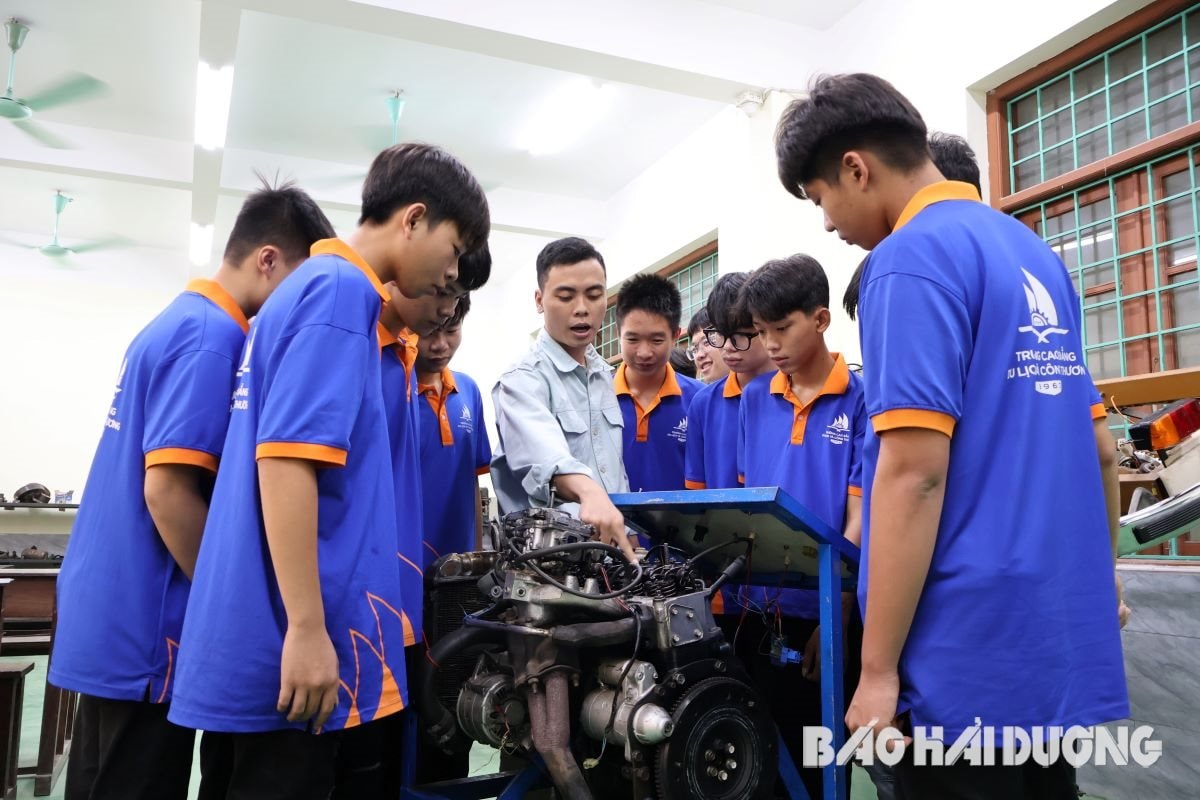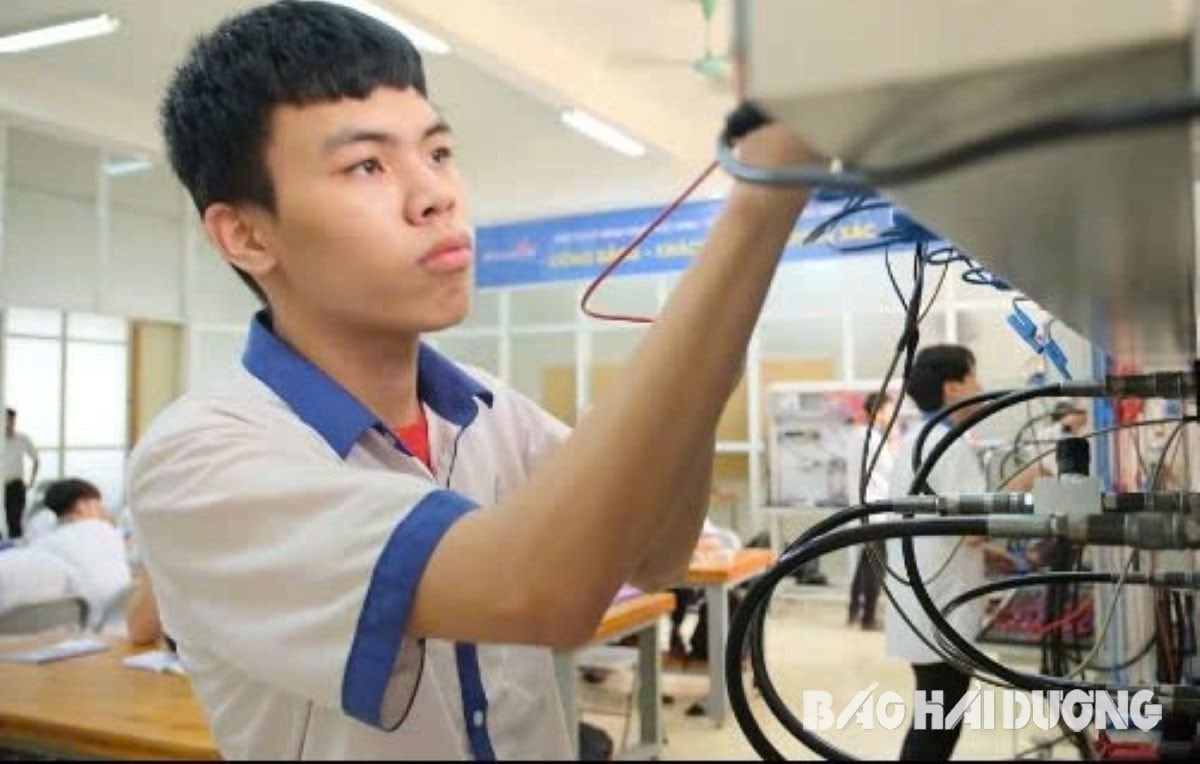Innovating vocational training with the model of "school in enterprise, enterprise in school" is a way for Hai Duong province to develop and improve the quality of vocational education in the spirit of Directive No. 21-CT/TW dated May 4, 2023 of the Secretariat.

Closely linked to business
College of Tourism and Industry (Lai Cach town, Cam Giang) always identifies training highly skilled human resources, with professional knowledge and good adaptability to the working environment as the consistent goal in training. The school has sought and connected with about 60 enterprises in and outside the province producing in fields related to the school's majors to carry out teaching cooperation.
Thus, instead of teachers and students studying together at the school's workshop, the school contacts businesses with suitable professions, creating conditions for lecturers and students to participate in studying at businesses, including support from business technicians. "Our policy is that schools and businesses are linked together in the spirit of schools in businesses, businesses in schools. Therefore, every year the school builds about 70% of the study program for students to practice. Of that 70% of practice time, students practice about 30% in businesses. In addition, all vocational teachers must visit businesses every year for 4-6 weeks to improve their professional skills. Our point of view is that schools provide professional knowledge, and businesses provide practical skills and discipline," said Mr. Duong Xuan Kien, Principal of the College of Tourism and Industry.
Hai Duong Vocational College (Ai Quoc Ward, Hai Duong City) is maintaining training in 8 college-level occupations and 7 intermediate-level occupations. During the training process, the school regularly innovates the content of the program, textbooks, teaching methods, linking training with service production, training links with businesses, and international cooperation. The school has cooperated with nearly 40 businesses in and outside the province to receive students for practice and internship, helping them access the production and business practices of the business. In addition, the school also cooperates with businesses in the process of building and evaluating the program, creating conditions for teachers to implement practical training programs at businesses according to regulations, and providing information on labor recruitment.
According to the Department of Labor, War Invalids and Social Affairs, currently 100% of vocational training institutions in Hai Duong have selected, evaluated, updated and publicized training programs and output standards according to regulations. Vocational training institutions regularly review and innovate training content and programs in a modern direction to suit reality. Some vocational training institutions have invited businesses, individuals and employers to participate in the process of building, editing and supplementing training programs and assessing the quality and capacity of learners, thereby helping students easily access the production process of enterprises.
Colleges and intermediate schools in the province have annually linked up with about 100 enterprises inside and outside the province. The main forms of linkage include: enterprises accepting students to work, accepting students for internships, accepting teachers for practice, accepting students to study and work, coordinating training and recruiting workers, transferring science and technology, participating in building training programs, evaluating, organizing graduation exams...

Good job response after graduation
The training linkage between schools and businesses not only provides students with practical knowledge, ensuring job requirements, but also helps them have many good job opportunities after graduation. Most schools in the process of training linkage with businesses will fulfill their commitment to recruit and create jobs for students after graduation. According to a survey of many vocational training institutions in Hai Duong, the rate of students who have jobs right after graduation is very high. In many professions, the starting salary of graduates is from 10-15 million VND/month, higher than the current average income of employees working in businesses.
With a basic training program, especially with links to businesses, the rate of students at the College of Tourism and Industry having jobs after graduation is over 90%. According to statistics from Hai Duong Vocational College, in recent years, 60% of students have jobs within 3 months after graduation; this rate is 95% after 6 months. Also thanks to the good implementation of links with businesses in teaching, the majority of students at Hai Duong Central College of Pharmacy have jobs immediately after graduation, and are well evaluated by employers for their professional qualifications as well as their ability to adapt to reality.
Mr. Pham Cong Doan, who has just graduated from the College of Tourism and Industry, said that thanks to the training connection with the enterprise, he was introduced by the school to work at the affiliated enterprise in Hung Yen. Because he had already interned at the enterprise, he only needed to do a short probationary period to be officially hired with a stable income.
Mr. Nguyen Dinh Huy, Head of Administrative Organization Department, Hoa Phat Hai Duong Steel Joint Stock Company saidStudents graduating from Hai Duong Vocational College have relatively good professional knowledge and especially the practical part after graduation is very professional in both skills and style, catching up with the company right when they first enter. During the probationary period, they only need a very short time to retrain to meet the job requirements. The vocational school's training direction in conjunction with businesses shows relatively good results.
It can be seen that the association of training and development of skilled human resources to meet the recruitment needs of enterprises is a fairly effective innovation in vocational training, which is of interest to all levels, sectors and localities in the province, creating many positive changes, especially in terms of awareness, enrollment scale, quality and training efficiency. Since then, more and more high-quality training models have emerged in line with the needs of enterprises, contributing significantly to improving the quality of human resources to meet the requirements of socio-economic development of the province.
THANH NGAHai Duong aims to have 43% of trained workers with certificates by 2030. Of which, the rate of trained workers in enterprises will reach 45% or more, while the rate of unskilled and simple workers in enterprises will be below 55%.